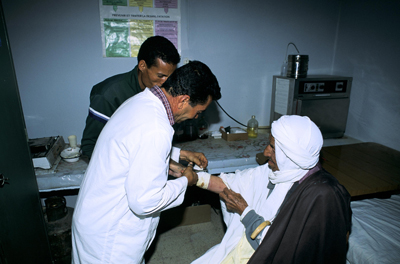Building Knowledge to Reform Hospital Management in Senegal

Summary
Reforms granting autonomy to Senegalese hospitals in 2002 did not lead to improvements in hospital performance or financial management. Less than ten years after the reforms, a World Bank study requested by Senegalese policymakers found that hospitals were struggling financially and that management was not sufficiently accountable to any entity. Meanwhile, Moroccan and Tunisian hospital reforms had led to better health outcomes and more efficient hospital administration. At the request of the Senegalese government, the World Bank’s South-South Facility funded a knowledge exchange for Senegalese Ministry of Health officials, hospital managers, and union leaders to visit Tunisia and Morocco to learn about the regulatory measures adopted by their peers in those countries.
“To foster policy changes, it is always better to have other countries display their convincing policy reforms rather than rely on reports or presentations by consultants,” said Christophe Lemière, Senior Health Specialist with the World Bank, who helped organize the exchange.
While reforms in Senegal stopped short of creating a new agency to oversee hospital management, the study tours helped build awareness and increase consensus about the need for better hospital management accountability in Senegal. A decree passed by Senegal’s government mandated hospitals to sign multiyear performance contracts specifying annual goals and objectives for each hospital. Senegal implemented the Initial agreements in the spring of 2011.
“These exchanges helped us identify the missing elements in our hospital reform. From Morocco and Tunisia, we saw that granting more management autonomy to hospitals also requires more accountability,” said Dr. Mboup, Director of Health Institutions in Senegal’s Ministry of Health and Prevention.
Beneficiaries / Participants
A number of African countries including Senegal have adopted policies granting greater management autonomy to hospitals. These initiatives include changes in hospital payment and budgeting systems and policies. Since the African knowledge base is weak in these areas, African governments often import policies and systems directly from the U.S. or Europe, usually with disappointing results.
In 2002, hospital reform policies in Senegal reduced government oversight of hospitals and gave them increased management autonomy over budgetary and human resource decisions. In addition, the government implemented several free health care programs during this period; however, the programs were largely underfunded. The result was that by 2008 most hospitals were running large cash shortfalls and nearing bankruptcy. At the request of the Senegalese Ministry of Health, an investigation by the World Bank found that hospitals had used their new powers to hire large numbers of unqualified staff and to authorize generous staff bonuses inconsistent with the hospitals’ financial situations.
Upon learning this, Senegalese policymakers set out to formulate new policies to oversee hospital institutions, and the World Bank began searching for examples of successful hospital administrative systems in Africa. The Bank identified Morocco and Tunisia, both of which had set up special government agencies to oversee hospital administration. A knowledge exchange was organized for Senegalese hospital managers, Ministry of Health officials, and union leaders to visit their peers in Morocco and Tunisia to learn how to improve the efficiency of hospital systems.

 China
China Colombia
Colombia Denmark
Denmark India
India Indonesia
Indonesia Mexico
Mexico Russian Federation
Russian Federation Spain
Spain United Kingdom
United Kingdom